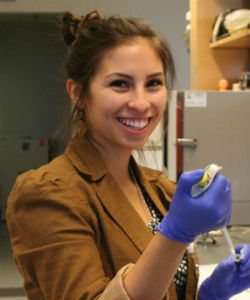
Bianca Flores, Ph.D.
Department: Neuroscience, 2020
Faculty Mentor: Eric Delpire, Ph.D.
Dissertation Title: The Role of KCC3 in Sensory Neuronal Homeostasis
Dissertation Abstract: A loss-of-function (LOF) the in the potassium chloride cotransporter-3, KCC3, results in hereditary sensorimotor neuropathy (HSMN) with Agenesis of the Corpus Callosum. Although, this disease is rare worldwide, HSMN/ACC is highly prevalent (~1 in 2000) in the Saguenay/Lac St. Jean region outside of Montréal, Québec. There are no current treatments for HSMN/ACC, but rather patients manage their pain through physical therapy and medication. LOF mouse models of KCC3 have accurately recapitulated the locomotor deficits and neuropathology observed in patients with HSMN/ACC. The body of dissertation work has sought to characterize the physiological relevance of KCC3 through three main ideas. First, we worked to characterize a gain-of-function (GOF) mouse model observed in one human patient that also exhibits HSMN but no ACC. Secondly, this work assessed the relevance of KCC3 and its role in cell volume in primary sensory neurons in all three genotypes: LOF, GOF, and wild-type. Finally, this dissertation has laid the foundational work to determine if KCC3 (SCL12A6) could be ever considered for gene therapy by temporally manipulating the expression of KCC3 in a separate mouse model. Ultimately, through this body of work we have demonstrated that KCC3 must exist in homeostatic range in order to function normally in neurons and prevent disease. Additionally, a disruption in KCC3 affects the ability of dorsal root ganglion (DRG) neurons to maintain and regulate their volume. Finally, our work indicates that function of KCC3 is critical during the developmental period, as deletion of KCC3 at postnatal days 20 or 60 did not lead to locomotor deficits.